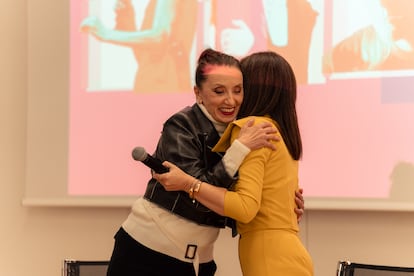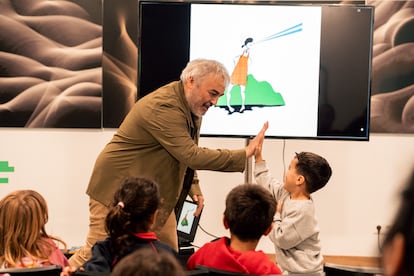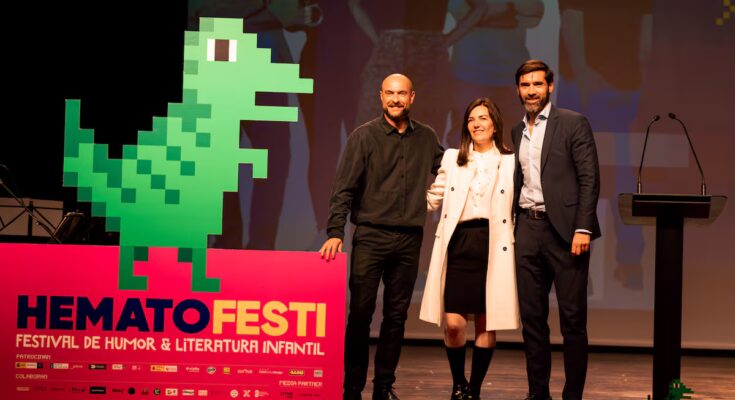Vigo woke up this Tuesday possessed by the spirit of Miguel López, aka The hematocritthe man from La Coruña who triumphed in the early days of social networks with his intelligent, witty and profound humour. 17 spaces in the largest city in Galicia were occupied by comedians, tweeters, video game lovers, cartoonists, storytellers, musicians, poets, directors and authors of children’s literature. It is the second edition of Hematofesti, a festival born as an act of resistance in the face of a tragedy, which on 27 November 2023 caused López’s genius to suffer a heart attack.
“The programming reflects Miguel’s concerns and our personal interests, which is why it is so varied and heterogeneous, it even seems chaotic.” The creator of this haematocritical catharsis speaks, the writer Ledicia Costas, National Prize for Literature for Children and Youth 2015 and life partner of who, in addition to being a famous tweeter, was a teacher and writer of children’s books. She and her team of friends and López admirers have created a five-day program that aims to unleash the imaginations of children and adults. Includes zine workshops, optical toys, “crazy drawing” or kamishibai (paper theater of Japanese origin) to a residency for comedians led by the Canarian comedian Ignatius Farray.
The story of this event that will last until Saturday begins just two months before the death of El Hematocrítico. López shared with Costas and two Galician friends and inhabitants of the world of culture a trip to a children’s literature festival in Sardinia: Alberto Vázquez, cartoonist and director with three Goyas, and the illustrator Bea Lema, National Comics Award 2025. They liked that event so much that they decided to replicate it in Galicia. The unexpected blow of losing López not only did not discourage Costas and Vázquez, but both decided to expand the project.
Last year, with the first anniversary of the misfortune and the shock a little digested, they began to organize “a big farewell party”. “We needed to celebrate how lucky we were to have such a person in our life,” Costas says. “We decided to organize a festival that reflected Miguel’s way of living, thinking, being and the fundamental pillars of his life: children, children’s literature, humor and popular culture.”

Thus was born the Hematofesti, which this week reaches its second edition. Other artists such as Luz Casal, Teresa Rabal and At the Hematofesti comedy school, five aspiring comedians are trained by Ignatius Farray in collaboration with the Galician artists Sobria and Serena and the playwright and narrator Paula Carballeira, National Award for Dramatic Literature in 2023.
The whole festival is full of laughter. The haematocritic was a master of humor and knew how to use it to connect with his little readers and help amaze them. “Humour is the fundamental driver of children’s literature and the ideal resource for talking about any type of topic. With it, even the most thoughtful and complex issues can be reduced and discussed with children,” explains Costas. She verified this herself thanks to the survey she developed to write an essay on how to encourage reading among the little ones. When you ask children what they look for in a book, they are very clear: “There wasn’t a single child between the ages of 5 and 12 who didn’t answer ‘have fun’”.

The Hematofesti awards an honorary award called Lenda do Recreo (Legend of Recreation) and this Saturday it will be presented to Teresa Rabal. For the organizers it is “an act of justice”, a “recognition in grand style” to a figure who shares the Hematocriticism philosophy. «Many of us grew up singing her songs, she was an actress, she created a program that discovered new talents, she founded a foundation for boys and girls… She is a woman who gave herself to the world of childhood», summarizes Costas.
The festival also dares with the economy. Under the watchful eye of artificial intelligence, this Friday a debate will be held in the Auditorium of the Zona Franca in Vigo on a crucial issue for the future of culture: the rights and pockets of creators. Entrepreneurs and artists will reflect on this, including Yolanda Castaño, winner of the 2023 National Poetry Prize, who wrote an essay on the precarious daily lives of poets. Costas, who has been self-employed for 12 years and earns his living from literature, recalls that when he started it was still “unseen to charge” for certain activities. “Society thinks that culture should be free, but forgets that culture contributes to GDP, that it creates jobs and, very importantly, that the people who engage in it pay the bills and go to the supermarket,” he points out. “Stop feeling that we are paid with visibility. The time has come to claim our rights.”



